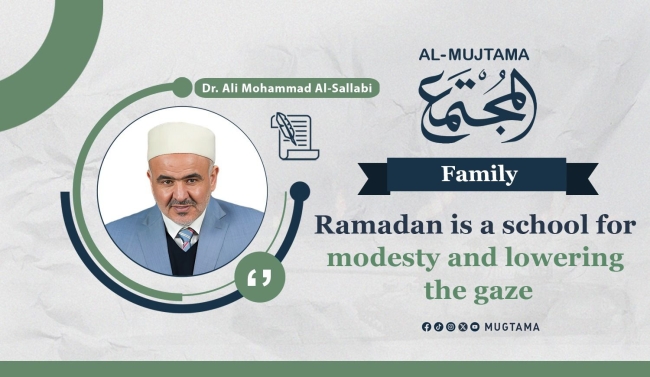Ramadan is a school for modesty and lowering the gaze Featured
Ramadan, the month of blessings and virtues, and abstaining from the forbidden, Allah Almighty has ordained its fasting upon Muslims, and the reasons for fasting are linked to piety: “O believers! Fasting is prescribed for you—as it was for those before you1—so perhaps you will become mindful (of Allah)” (Al-Baqarah: 183).
Among the aspects of piety is modesty, safeguarding the eyes from seeing the forbidden, and safeguarding the ears from hearing it. Indeed, the sin of looking at the forbidden is perhaps the most prevalent sin in this era, indeed it is the most prevalent. It is often accompanied by the sin of hearing the forbidden, even though looking at the forbidden is more common than hearing it.
Allah Almighty has commanded the believers, and similarly, He has commanded the believing women to lower their gaze, because that is a requirement of faith and vigilance. He says “(O Prophet!) Tell the believing men to lower their gaze and guard their chastity. That is purer for them. Surely Allah is All-Aware of what they do {30} And tell the believing women to lower their gaze and guard their chastity, and not to reveal their adornments except what normally appears” (Surah An-Nur).
Likewise, safeguarding the gaze aids in safeguarding one's chastity, and safeguarding them both together safeguards a person from regret on the Day of Judgment. For the forbidden glance is like a poisoned arrow, and the heart is the one affected by it. Every time the gaze is cast upon the forbidden, the heart sinks deeper into darkness, and deceit and stains cover it. This unjust stain may obscure the clarity of vision, blinding one from seeing the truth or understanding guidance, causing confusion, such that one can hardly distinguish between what is good and what is evil, or taste the sweetness of truth, or the bitterness of falsehood.
And the sweetness of faith bequeaths noble sensations, offering compensation and solace for what the devil tempts with forbidden pleasures. Yet Allah Almighty knows the weakness of humans, and He knows that complete abstention from looking is not feasible for the accountable person with sight. Thus, His command is to lower their gaze, not to avert it completely. He suffices us with diligence in striving to refrain from looking at the forbidden. Therefore, when the sight falls upon the forbidden, one should immediately suppress it, out of reverence for Allah's command. The Prophet Muhammad ﷺ said to Ali (may Allah be pleased with him): "O 'Ali! Do not follow a look with a look, the first is for you, but the next is not for you."
Lowering the gaze and safeguarding one's chastity, if it leads to restraining oneself from the causes of destruction, it also has its rewards. Indeed, its reward cannot be matched by anything of this worldly life, even if it were to fill it to its utmost capacity, nor can its adornments equal it even if they were complete. The Prophet Muhammad ﷺ said: "Whoever can guarantee (the chastity of) what is between his two jaw-bones and what is between his two legs (i.e. his tongue and his private parts), I guarantee Paradise for him." Since lowering the gaze is the greatest aid in safeguarding one's chastity, it is mentioned before guarding the private parts in the verse, because the gaze is the scout for obscenity, the precursor to lewdness, and the affliction it causes is severer, while the ability to control it is harder.
The Pious Predecessors and Lowering the Gaze
The righteous predecessors paid great attention to lowering the gaze, and we find from them positions and admonitions in this regard that indicate the loftiness of their determination in this matter. An example of this is the saying of Anas (may Allah be pleased with him): “If a woman passes in front of you, lower your eyes until she has passed by.”
Abu Al-Husayn Al-Warraq said: “Whoever lowers his gaze from the forbidden, Allah will grant him wisdom on his tongue, guiding those who hear it. And whoever lowers his gaze from doubtful matters, Allah will illuminate his heart with a light by which he is guided to the path of His pleasure.”
Al-Qurtubi said: “The sight is the greatest gateway to the heart, and the most active of the senses towards it. Accordingly, the falls from this aspect are numerous, necessitating warning against it. Lowering it is obligatory regarding all prohibitions and anything that may lead to temptation.”
Ibn Al-Jawzi said: “In our time, Abu Al-Hasan ibn Ahmad Al-Harbi would not walk except with a cloth over his head, using it to shield his sight from wandering.”
All these narrations from the predecessors indicate the danger of looking at the forbidden and the corruption it causes to the heart. Therefore, whoever seeks to rectify their heart in this noble month should avoid the forbidden, lower their gaze from it, and protect their hearing from it. Even if it means spending more time in the mosque to avoid seeing the forbidden. Abu Hurairah and his companions, when they fasted, would sit in the mosque and say, 'We purify our fasting.'
The believer is commanded to lower their gaze from what Allah has forbidden in all circumstances and at all times. This command is even more stringent in Ramadan, as it is the month of worship and drawing closer to Allah. It is not befitting for a believer to engage in actions during this month that distance them from their Lord, especially when they should be striving to draw nearer to Him.


